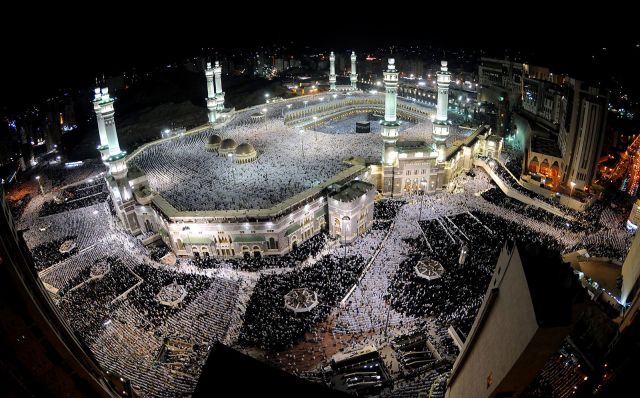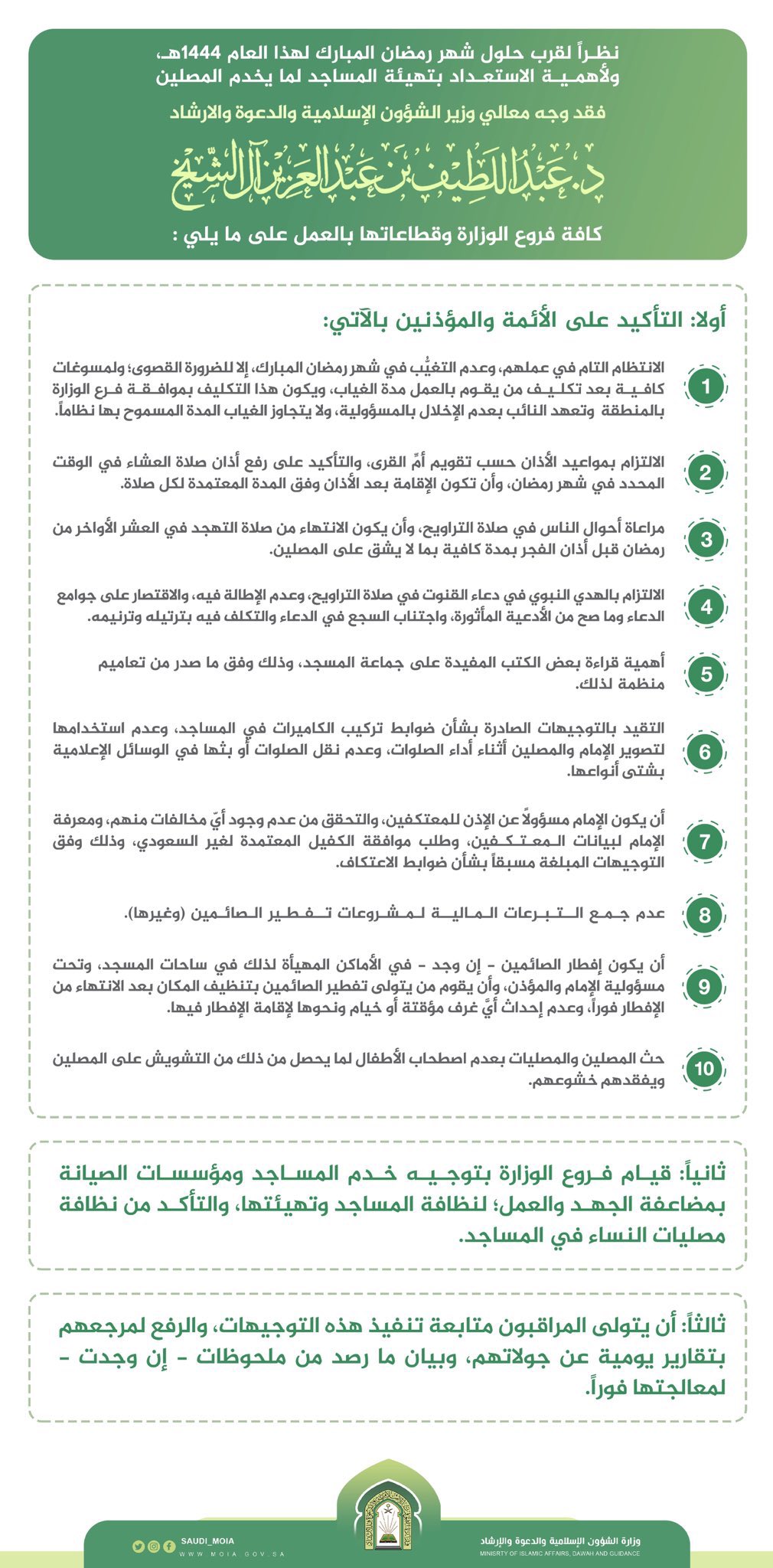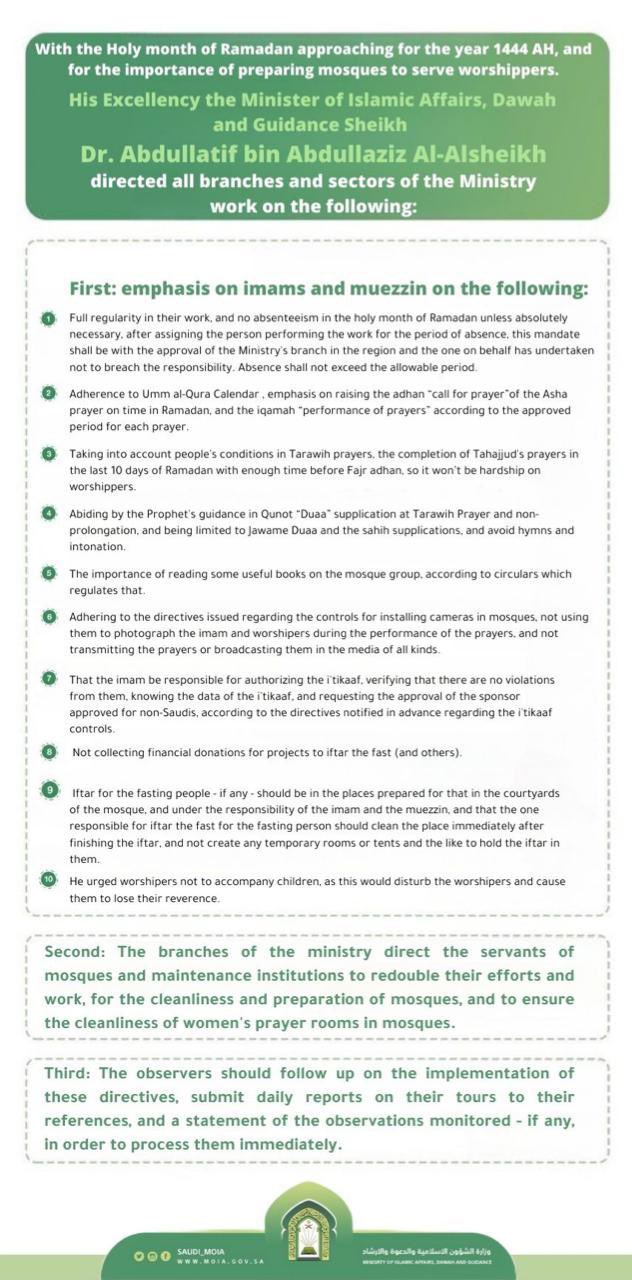No loudspeakers, Iftaar insides mosques or children allowed as per the new rules Photo BestTourism
Saudi Arabia – The Kingdom of Saudi Arabia has announced a set of rules and regulations for the holy month of Ramadan this year. The new rules include a ban on filming or broadcasting of prayers within mosques and forbidding mosques from collecting financial donations for organising meals for ifaar (the fast-breaking evening meal of Muslims in Ramadan).
The Minister of Islamic Affairs, Dawah and Guidance Sheikh, Dr Abdullatif bin Abdulaziz Al-Alsheikh, released and circulated a 10 point document in Arabic, outlining the necessary preparations for mosques and worshipers. The English version was soon circulated and while the translation is “awkward” it clearly sets out that the Prime Minister of Saudi Arabia, Mahommed bin Salman wants to restrict Ramadan, said Samid Hamid, Managing Director of International Interest.
The restrictions on prayers and Duas
The first two points are straightforward. The Imaam should not be late or absent and the Azaan (call to prayer) should be on time. However, number three is where the restrictions begin to emerge. The translated version’s sentence structure might be awkward but makes clear that calls for prayers to be shortened and not lengthy. Point number four adds to this saying calls for the Dua (supplication) should also be shortened and Imaams must stick to general supplications, explained Hamid.
“Bin Salman has been taking measures to replace Imaams who make more contentious supplications such as on issues of Palestine and condemnation of Israel with whom he is considering normalisation of ties. Bin Salman’s appointing of Muhammad Al-Issa to lead the khutbah during Hajj at Arafat was a clear indication that Bin Salman is seeking to tone down the language used by Imaams and use the religious platforms to either reinforce his wider Vision2030 policies or restrict any criticism of them.”
According to Channel 12 Arab affairs analyst Ehud Ya’ari, Sheikh Dr. Mohammed bin Abdul Karim al-Issa appointment to lead the khutbah was a clear sign from Saudi Arabia regarding its attitude towards normalisation with Israel.
Restriction on what books to read
Back in 2021 Bin Salman changed the curriculum of schools in the Kingdom. He ordered a sweeping reduction in the hours spent on Quraan, Islamic Studies and the Arabic language. Rule number five states that Imaams should place importance on reading some useful books ‘according to circulars which regulate that’. For Hamid, this is a dark warning from Bin Salman. Scholars who have criticised this move have been thrown in prison, said Hamid.
“This order may appear like it’s nothing. It may appear that it’s just about books but its gravity can only be appreciated in the context within which Bin Salman is transforming religious education. This is not a rule or recommendation. It’s a warning to tow the increasingly anti-Islamic line.”
Broadcasting the prayers are strictly forbidden
There are many across the globe who listen to the various mosques in the Holy Land during Ramadan. However, that will soon come to an end. According to rule number six, the broadcasting of the performance of prayers is no longer allowed. While one may argue this is for religious reasons, it is interesting to note that this does not apply to Makkah and Medinah. Hamid argued that it is not for religious reasons but rather to avoid the backlash Bin Salman faced when he tried to implement this last year.
“If Bin Salman could silence the two holy mosques he would. However the backlash from last year at the suggestion that he was about to do so was such that he is unlikely to want to provoke it again.”
This policy follows the same policy that was imposed in 2021 which called for the volume of loudspeakers to be reduced. To Hamid, this is all part of Bin Salman’s plan to quieten Islam and raise the volume of his Vision2030 plans.
“It is more about Bin Salman’s Vision for Saudi Arabia as one where Islam is no longer at the centre of Saudi identity. These rules are about reducing the ‘volume’ of Islam in the kingdom and building on policies that have seen mosques banned from using loudspeakers for Quranic recitation and restricted regarding the call to prayer. The rules follow up on Bin Salman’s revamping of the education system where he has significantly reduced hours that students spend studying Islam, Quran and Islamic studies.”
SMread: Global Ramadan Traditions: Preparations and Celebrations
The rules of Itikaf
Itikaf is the practice in Islam where people from the community seclude themselves in the mosque during the final 10 days of Ramadan solely dedicating their time to the worship of Allah (SWT). Rule number seven calls for Imaans to “collect information on those performing Itikaf”. The rule sounds normal at first but, as Hamid notes, it is not about collecting information but what the government will do with such information.
“In abstract, the rule is understandable. A mosque should know who is making i’tikaf. The problem however is that arrests of religious figures are rampant, and there is an increasing crackdown on religious expression. Therefore, the problem is not the collecting of information, but what the Saudi government will most likely do with it.”
This is the same language used by Tunisia’s former dictator, Zine El Abidine Ben Ali and the former Soviet Union used to compile a list of “zealous Muslims” who would then be subjected to surveillance and harassment, explained Hamid. When prominent Ulama are being arrested for speaking out, one can only wonder how this information will be used.
SMread: Keeping Mosques Safe During Ramadan
Banning donations and having iftaar in the mosque
It was narrated from Zaid bin Khalid Al-Juhani that the Messenger of Allah (ﷺ) said: “Whoever gives food for a fasting person to break his fast, he will have a reward like theirs, without that detracting from their reward in the slightest.” (Sunan Ibn Majah 1746)
It is upon this narration that Muslims donate towards the iftaar that happens in the mosque. Rule eight and nine ban mosques from taking donations as well as banning iftaar from taking place in the mosque. Around the world, no matter where you go, iftaar is held in mosques. A sheet is rolled out, dates and drinks are provided for a person to break their fast. The rule states it should be replicated in the courtyard. Hamid sees this as a way for the government to restrict the atmosphere that Ramdan creates in mosques and in public.
“These measures are about restricting the expression of Ramadan in public, and discourage people from celebrating it in communal spaces instead of their homes. It is worth noting here that Bin Salman has also ordered that anyone who is not fasting should not be chastised if they are seen to be eating in public.”
Lastly, rule number 10 enforces this idea by banning parents from bringing their children to the mosque. This rule is similar to Soviet states that banned children from going to the mosque in order to restrict Islamic influences on children, said Hamid.
Zahack Tanvir, Director of Milli Chronicle Media London, says otherwise. He believes that Bin Salman is trying to dilute Islam and these rules have only caused “unrest among the ranks of the extremist”. The word “extremist” is often used in mainstream media to define a person who practises Islam in its true and proper form.
The backlash to the rules and Vision2030
The restrictions have sparked outrage and backlash from Muslims worldwide. The most recent backlash came from Sheikh Emad Al-Mobayed, the Imaam of the King of AbdulAziz mosque in Dammam. This won’t change Bin Salman’s rules but Hamid is worried about how Bin Salman will handle it.
“Bin Salman has been swift in cracking down on all backlash and dissent with swathes of critics, Imaams, scholars and activists thrown into prison, with some facing death sentences for their criticism. The issue is not the absence of backlash, but the brutal manner Bin Salman deals with it.”
For Hamid, it seems clear that Bin Salman wishes to shift Islam from the public sphere to the personal sphere specifically “to confine it to the provinces of Mecca and Madinah”. With his mind solely focused on Vision2030, more policies could be introduced to blow out the light of Islam in the Holy Lands.
“The date of the founding of Saudi Arabia has been changed from the year in which Mohamed Al Saud and Mohamed Bin AbdulWahhab agreed to ‘re-establish Islam’ to 1727 when Mohamed Al Saud came to be chief of his tribe. In other words, Bin Salman has sought to change the founding from an Islamic endeavour to a tribal, nationalist one. Bin Salman is steadily pushing Islam out of public life with the ultimate aim of chaining it as an influence restricted to personal issues as opposed to a defining political and legal identity of the state.”


